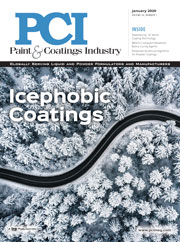Nanodiamond-Enhanced Electroless Nickel Plating Shows Improved Wear Resistance
Carbodeon Ltd. Oy has announced improvements to electroless nickel including a 3x improvement in wear resistance through the controlled addition of nano-diamonds.

Nanodiamond particles are hardwearing, small and offer very low surface friction. Since their discovery in cold-war Russia, they have been a little-known secret used to improve the performance of hard chrome plating. Platers have added liquid suspensions containing clusters of these diamond particles into the electrolyte and experienced significant improvements in durability of the plating for such applications as gun barrels and machine parts. NanoDiamonds are synthesized by a detonation process that results in diamond particles with surface functionalization, enabling them to have a positive charge in solution and to deposit together with the metal ions in the plating process.
Carbodeon has developed modified versions of these nanodiamonds, where the surface functionalization is specifically controlled. For plating applications, the result is that the particle charge or “zeta potential” is much higher - around 50% more than traditional nanodiamonds.
This creates an additional separation force between the nanodiamond particles and has enabled Carbodeon to develop a liquid dispersion of individual 4-6 nm particles instead of the traditional clusters measuring from 100 nm up to a few microns in size.
The result is that the surface-area-to-volume ratio of the diamonds increases by one to two orders of magnitude. By depositing genuine nanoscale particles into metal plating, Carbodeon aims to make the addition of nanodiamond to metal plating more economical.
Vesa Myllymaki, CTO, explained, “Throughout our work at Carbodeon, we have focused on delivering unagglomerated nanodiamond particles into parent materials in order to achieve material improvements with substantially less than 1wt% diamond content, where previously people have used several percent diamond content in agglomerated form and gained less performance than we have. We have already achieved this with nanodiamonds in polymer coatings and thermal compounds, and now we have proved it is also possible in certain types of metal plating.”
Carbodeon has been supplying its uDiamond nanodiamonds to the plating industry for some years, but the potential to use the newly developed “dispersion grade” materials prompted the company to invest in a plating laboratory at the end of 2013.
Myllymaki continued, “We already had some programs with hard chrome, electrolytic nickel and with gold, but we needed our own lab in order to properly support our customers. For the first in-house development we decided to look at electroless nickel by applying our first-generation aqueous nanodiamond dispersion uDiamond® Andante. Electroless nickel is a plating technology that has not been as widely adopted as it deserves, so we felt it needed a performance boost, which we have certainly delivered with this announcement.”
While the traditional dosage rate for plating with agglomerated nanodiamonds is 10g/litre of electrolyte, the optimum dose using dispersed nanodiamond in electroless nickel has been found to be just 0.05 g/litre. GDOES (glow discharge optical emission spectroscopy) shows the diamond content in the plating to be at 0.2%, and SEM (scanning electron microscope) images show the particles having to a large extent been deposited as discrete <10nm particles. Wear testing results using the Taber Rotary Abrasion method shows that the as-plated medium phosphorous electroless nickel has a wear index of six, compared to 18 of the unmodified plating – a three-times improvement.
“Success with nanodiamonds means achieving more with less, and we have done that,” said Vesa Myllymaki. “The cost of the diamond in the process is less than the cost of the nickel, and in terms of the total component or system value, this is a really economic way of upgrading the performance of the plated surface.”
Carbodeon is now investigating applications in a range of industries, where the company's aim is to supply the Carbodeon uDiamond nanodiamond materials to existing platers. Meanwhile, the company’s plating lab will continue with the development of other types of nanodiamond-enhanced plating.
Looking for a reprint of this article?
From high-res PDFs to custom plaques, order your copy today!




